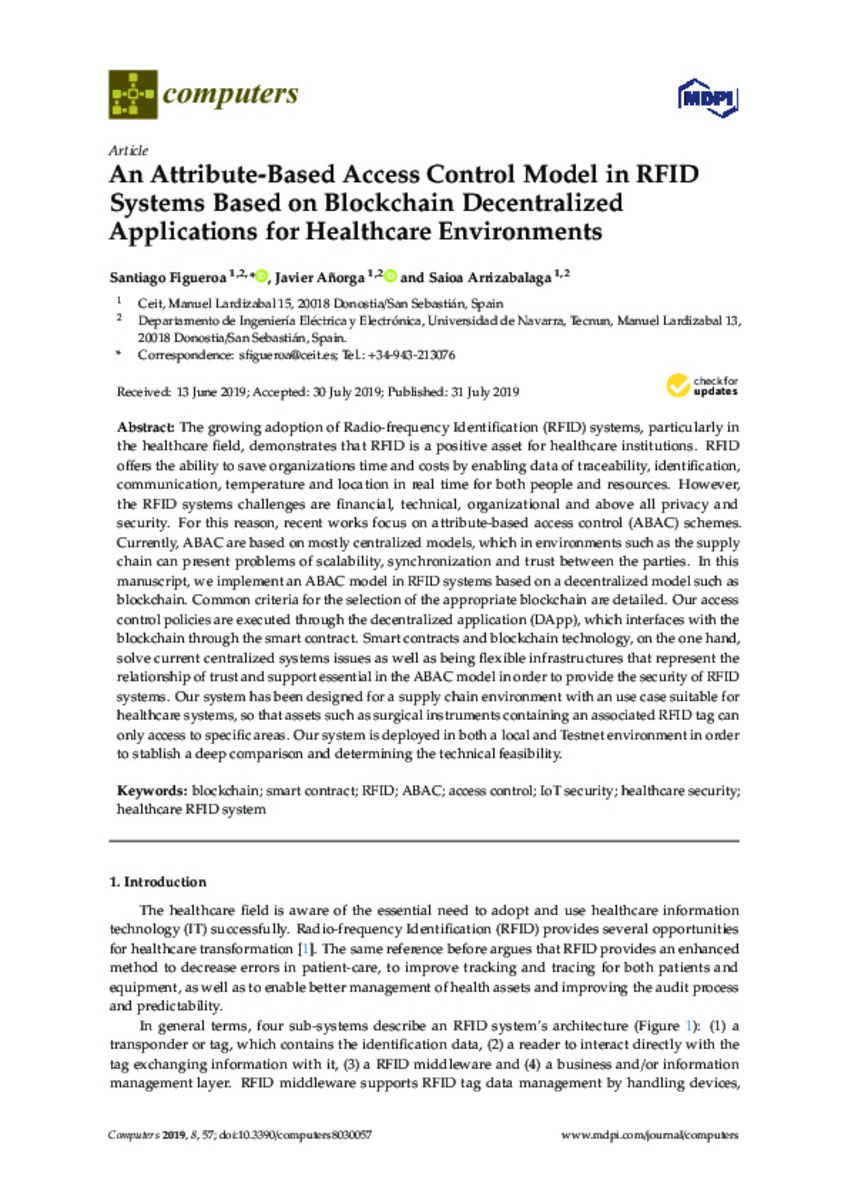Full metadata record
| DC Field | Value | Language |
|---|---|---|
| dc.creator | Figueroa-Lorenzo, S. (Santiago) | - |
| dc.creator | Añorga-Benito, J.(Javier) | - |
| dc.creator | Arrizabalaga-Juaristi, S. (Saioa) | - |
| dc.date.accessioned | 2022-01-10T15:49:08Z | - |
| dc.date.available | 2022-01-10T15:49:08Z | - |
| dc.date.issued | 2019 | - |
| dc.identifier.citation | Figueroa Lorenzo, S. (Santiago); Añorga Benito, J.(Javier); Arrizabalaga Juaristi, S.(Saioa). "An attribute-based access control model in RFID systems based on blockchain decentralized applications for healthcare environments". Computers. 8 (3), 2019, 57 | es |
| dc.identifier.issn | 2073-431X | - |
| dc.identifier.uri | https://hdl.handle.net/10171/62693 | - |
| dc.description.abstract | The growing adoption of Radio-frequency Identification (RFID) systems, particularly in the healthcare field, demonstrates that RFID is a positive asset for healthcare institutions. RFID offers the ability to save organizations time and costs by enabling data of traceability, identification, communication, temperature and location in real time for both people and resources. However, the RFID systems challenges are financial, technical, organizational and above all privacy and security. For this reason, recent works focus on attribute-based access control (ABAC) schemes. Currently, ABAC are based on mostly centralized models, which in environments such as the supply chain can present problems of scalability, synchronization and trust between the parties. In this manuscript, we implement an ABAC model in RFID systems based on a decentralized model such as blockchain. Common criteria for the selection of the appropriate blockchain are detailed. Our access control policies are executed through the decentralized application (DApp), which interfaces with the blockchain through the smart contract. Smart contracts and blockchain technology, on the one hand, solve current centralized systems issues as well as being flexible infrastructures that represent the relationship of trust and support essential in the ABAC model in order to provide the security of RFID systems. Our system has been designed for a supply chain environment with an use case suitable for healthcare systems, so that assets such as surgical instruments containing an associated RFID tag can only access to specific areas. Our system is deployed in both a local and Testnet environment in order to stablish a deep comparison and determining the technical feasibility. | es_ES |
| dc.language.iso | eng | es_ES |
| dc.publisher | MDPI AG | es_ES |
| dc.rights | info:eu-repo/semantics/openAccess | es_ES |
| dc.subject | Blockchain | es_ES |
| dc.subject | Smart contract | es_ES |
| dc.subject | RFID | es_ES |
| dc.subject | ABAC | es_ES |
| dc.subject | Access control | es_ES |
| dc.subject | IoT security | es_ES |
| dc.subject | Healthcare security | es_ES |
| dc.subject | Healthcare RFID system | es_ES |
| dc.title | An attribute-based access control model in RFID systems based on blockchain decentralized applications for healthcare environments | es_ES |
| dc.type | info:eu-repo/semantics/article | es_ES |
| dc.description.note | Licensee MDPI, Basel, Switzerland. This article is an open access article distributed under the terms and conditions of the Creative Commons Attribution (CC BY) license (http://creativecommons.org/licenses/by/4.0/). | es_ES |
| dc.identifier.doi | 10.3390/computers8030057 | - |
| dadun.citation.number | 3 | es_ES |
| dadun.citation.publicationName | Computers | es_ES |
| dadun.citation.startingPage | 57 | es_ES |
| dadun.citation.volume | 8 | es_ES |
Files in This Item:
Statistics and impact
Items in Dadun are protected by copyright, with all rights reserved, unless otherwise indicated.






